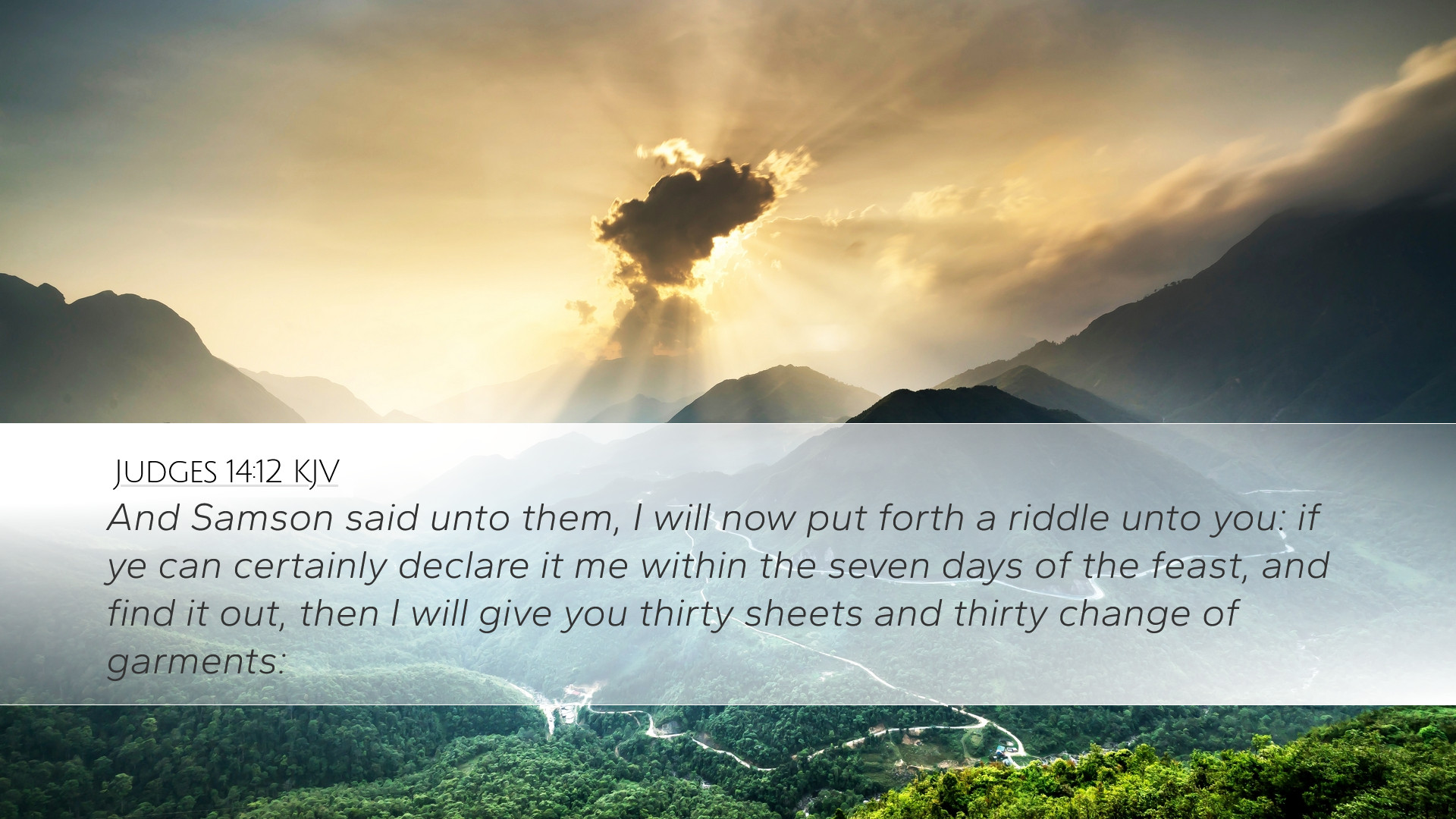Old Testament
Genesis Exodus Leviticus Numbers Deuteronomy Joshua Judges Ruth 1 Samuel 2 Samuel 1 Kings 2 Kings 1 Chronicles 2 Chronicles Ezra Nehemiah Esther Job Psalms Proverbs Ecclesiastes Song of Solomon Isaiah Jeremiah Lamentations Ezekiel Daniel Hosea Joel Amos Obadiah Jonah Micah Nahum Habakkuk Zephaniah Haggai Zechariah MalachiJudges 14:12
Judges 14:12 KJV
And Samson said unto them, I will now put forth a riddle unto you: if ye can certainly declare it me within the seven days of the feast, and find it out, then I will give you thirty sheets and thirty change of garments:
Judges 14:12 Bible Commentary
Commentary on Judges 14:12
Judges 14:12 states: "And Samson said unto them, I will now put forth a riddle unto you: if ye can certainly declare it me within the seven days of the feast, and find it out, then I will give you thirty sheets and thirty change of garments:"
Contextual Overview
This verse occurs during the story of Samson, a judge of Israel chosen by God to deliver His people from oppression. The narrative unfolds at a wedding feast, where Samson, inflamed with passions and desires, sets forth a riddle that acts as a significant motif in understanding human relationships and divine purpose.
Analysis and Insights
The Nature of the Riddle
Samson's riddle is profound, not merely as a game of wit, but as a representation of deeper spiritual truths. Adam Clarke emphasizes that the riddle is symbolic, encapsulating the paradox of life and death. The challenge posed by Samson serves to illustrate the contrasts inherent in God's creation, such as life emerging from death, evident in the context of the lion he slew.
Symbolism of the Feast
The wedding feast itself is laden with significance. Matthew Henry indicates that such events often symbolize joy but can also be rife with tension. In Samson's case, the joyous occasion of marrying a Philistine woman is overshadowed by his own inner turmoil and the ensuing conflict between his Israelite roots and the Philistine culture.
The Seven Days of Competition
Samson stipulates a time frame of seven days for the riddle to be solved—an allusion to biblical times of testing and completion. Albert Barnes notes that seven represents divine perfection and testing. The insistence on this time constraint accentuates the theme of intellect versus divine wisdom; humans struggle to comprehend God’s ways, which are often hidden beneath the surface.
Theological Implications
Human Wisdom vs. Divine Revelation
The exercise of presenting a riddle dives into the dichotomy of human wisdom contrasted with divine revelation. Clarke posits that while the Philistines may have perceived themselves as clever and wise, they were outwitted in the grand scheme by God’s divine providence acting through Samson. This serves as a reminder of the futility of human pride when faced with the omniscient Creator.
Root of the Conflict
The introduction of the riddle spurs conflict, illustrating the underlying tensions between Samson and his Philistine guests. Matthew Henry elaborates on this point, suggesting that the riddle becomes an instrument of both revelation and frustration. These tensions foreshadow the tragic downfalls and conflicts present in the life of Samson, highlighting the complexity of social relationships interwoven with divine destiny.
Lessons from Samson's Character
Samson's actions, especially in presenting this riddle, are indicative of his complex character. His strength is matched with a vulnerability to temptation and vanity. This duality is significant for pastors and theologians, encouraging reflection on how human nature often intertwines strength with weakness, echoing the struggles faced in spiritual maturation.
Application for Modern Believers
For present-day believers, the lessons drawn from Samson's riddle can manifest in various practical applications:
- Wisdom in Communication: Believers are encouraged to communicate truth through parables and riddles, reminiscent of Christ's teaching style, urging others to seek deeper understanding.
- Embracing Conflict: Just as Samson encountered opposition, believers must recognize that engaging with challenges is part of faith and spiritual growth.
- Awareness of Cultural Influences: Reflecting on Samson's marriage to a Philistine, the modern church is reminded to discern cultural influences that may detract from spiritual integrity.
- Seeking Divine Guidance: As Samson relied on his own intellect, believers should seek divine wisdom and guidance in all matters.
Conclusion
In Judges 14:12, we witness a profound moment that captivates the interplay between human cunning and divine providence. The riddle serves not merely as a challenge but as a spiritual metaphor that invites reflection on wisdom, the nature of conflict, and the complex character of Samson. For pastors and scholars alike, this verse presents an opportunity to engage deeper with the text, extract valuable lessons, and apply them to contemporary faith contexts.


